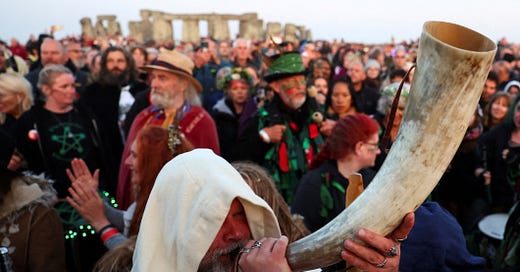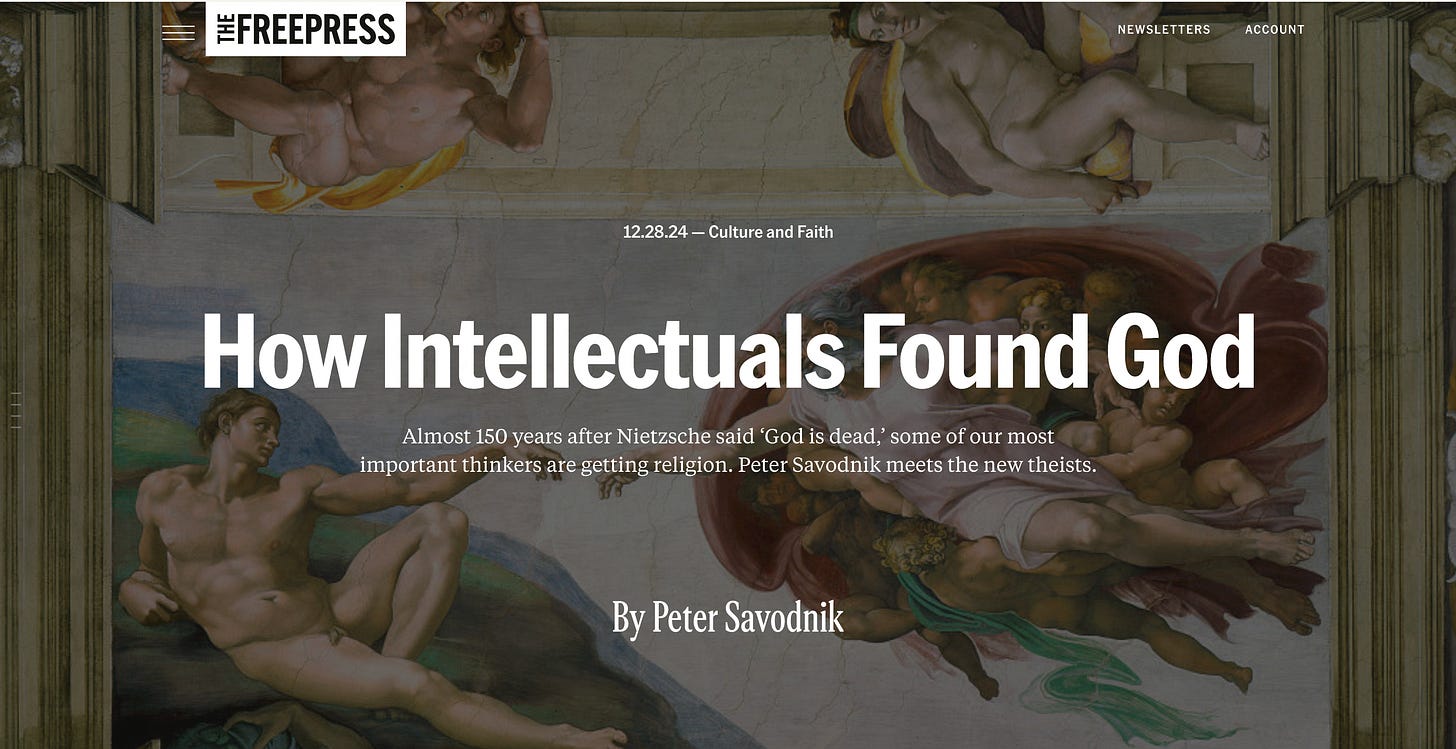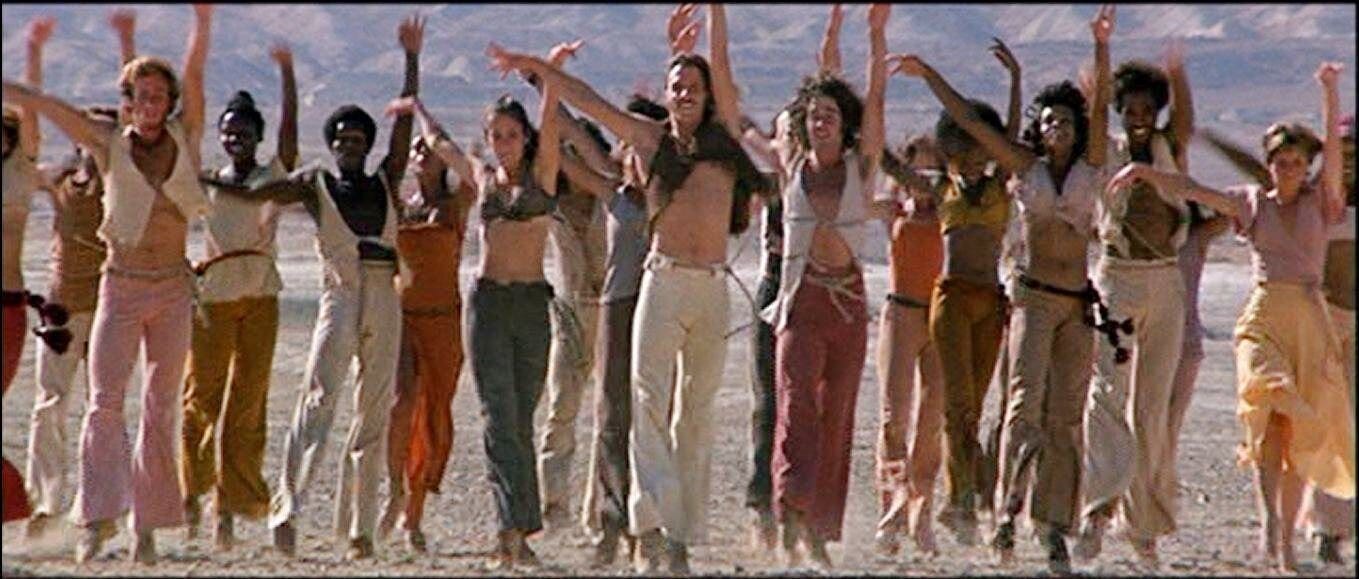Housekeeping/Invite: If you dig these essays and would like to jump into a community of folks discussing these sorts of things, and a whole bunch more, check out the HomeGrown Humans Community. Launch ends this week.
Give me that old time religion
Give me that old time religion
Give me that old time religion
It's good enough for me
We will pray with those Egyptians
Build pyramids to put their crypts in
Cover subways with inscriptions
And it's good enough for me
We will pray with those old druids
Though they drink fermented fluids
Waltzing naked though the woo-ids
And it's good enough for me
We do dances to bring water
Prepare animals for slaughter
Sacrifice our sons and daughters
And it's good enough for me
–Pete Seeger
(a Druid absolutely slamming a beer bong on the Sumer Solstice)
#theUKway
Alright. This one could be an entire book, but for now, just gonna share some recent observations. And sling some links that will make for a fascinating week of reading, if you’re into that kinda thing.
Will split this into two parts–today will be high level overview and next week will be reporting from our undercover investigation into Texas churches.
As lately, things have been going apeshit for Jesus.”
Everyone and their virgin mother are now offering hot takes on “the Christian turn.”
And it’s only gaining momentum and getting weirder by the day.
Bari Weiss and the Free Press crew are hosting a philosophy slam Does the West Need a Religious Revival? with Ayaan Hirsi Ali and the NYTs Ross Douthat arguing For and those godless reprobates Adam Carolla (atheist comic podcaster) and Michael Shermer (Grand Skeptic) arguing Against.
It’s happening in Austin at the end of Feb in the historic Paramount Theater downtown, so give us a shout if you’re gonna be there. Tickets are on the verge of selling out already!
To watch four people.
on a stage.
debate religion.
#suckitTikTok
Interestingly, the Paramount is also the place I saw Russel Brand’s Messiah Complex years ago, so…full circles on circles as he’s now he’s converted and repentant. Clearly he was just soft-socializing ideas he’d later run with.
Also in the Free Press, Peter Savodnik did a deep dive on the Intellectuals Who’ve Found God. This included Hirsi Ali, but also Jordan Peterson (who I’d talked with a few months back) and Jordan Hall (an old friend and former uber-rationalist who’s made the switch). It also name-checks Peter Thiel, Elon Musk and Joe Rogan as conversion-adjacent.
Something profound is happening. Instead of smirking at religion, some of our most important philosophers, novelists, and public intellectuals are now reassessing their contempt for it.
They are wondering if they might have missed something. Religion, the historian Niall Ferguson told me, “provides ethical immunity to the false religions of Lenin and Hitler.”
There is something inevitable about this reassessment, Jonathan Haidt, the prominent New York University psychologist and best-selling author, told me. (Haidt’s books include The Righteous Mind: Why Good People Are Divided by Politics and Religion.)
“There is a God-shaped hole in every human heart, and I believe it was put there by evolution,” he said. He was alluding to the seventeenth-century French philosopher Blaise Pascal, who wrote extensively on the nature of faith.
“We evolved in a long period of group versus group conflict and violence, and we evolved a capacity to make a sacred circle and then bind ourselves to others in a way that creates a strong community,” Haidt told me.
In the Fall I’d written Mudwrestling with God tracking these shifts among the intelligentsia. It’s worth a read, just to click on the Vanity Fair and New York mag articles that inspired it.
But this trend isn’t going away. It’s building. And mutating.
And where it could go with the rightward turn in Western culture right now, is anybody’s guess.
Somewhere between a Third Great Awakening and a reboot of the Crusades.
Jesus Christ Superstar, or Handmaid’s Tale.
I’ll take Blissed Out Hippies and the Sermon on the Mount over Militant Fundamentalism and a Vengeful Old Testament God for $1000, please Alex.
#doublejeopardy
That Free Press article I just mentioned highlights how the current state of our world is directly impacting belief.
For sure, “Wokeism’s” excesses turned a lot of folks off radical secularism.
And Fox News Christians have forever made hay out of the Marxist Grinches who tried to steal Christmas.
But beyond those tired and true culture war skirmishes, something deeper seems afoot.
Existential dread.
We’re all kinda wigging out and seeking shelter from The Storm.
#Qwasright
#noatheistsinwormholes
And that’s prompting all sorts of formerly reasonable people to talk their way into a leap of faith.
Consider Timothy Morton, the Rice University professor who coined the term “hyperobject” back in 2013.
He’s making the case that religion is one of the last tools we’ve got left in the toolkit to wrestle with the polycrisis.
If human beings are going to work genuinely and effectively on the climate crisis, they are going to need to work at a psychological level so profound that perhaps only religions have discovered the intensity with which these tasks are to be carried out…What is required is a reckoning with ecotrauma.
You could go further, and make the case that any contemporary religion that does not explicitly address the polycrisis (relying instead on ancient or timeless assurances as to the state of this world and the next) is simply, and deeply no longer fit for purpose.
Nick Bostrum is the Oxford philosopher who brought us such gems as the Simulation Hypothesis and coined the terms Existential Risk and Polycrisis themselves.
Now, via the contortions and backbends of hyper-rationalism, he has come to conclude that, in fact, there (probably) is a God!
From one of his recent (not yet formally published) papers…
Human civilization is most likely not alone in the cosmos but is instead encompassed within a cosmic host
● The “cosmic host” refers to an entity or set of entities whose preferences and concordats dominate at the largest scale, i.e. that of the cosmos.
● For example, the cosmic host might conceivably consist of galactic-scale civilizations, simulators, superintelligences, and/or a divine being or beings.
● Naturalistic members of the cosmic host presumably have very advanced technology…It’s possible that some members might have capabilities that exceed those that are possible in our universe:
● Non-naturalistic members of the cosmic host presumably have analogous capabilities supernaturally. (Edit #godmode)
● There probably is a cosmic host.
Which is kinda funny. And sweet. I mean, what a circuitous and labored path to awe and reverence!
#improbablyprobable
So it’s not only the fools who are rushing in where angels fear to tread.
It’s hucksters.
And nutjobs.
And influencers.
And clever people too.
Even they seem out of ideas, and in need of hope.
“She walked up to me so gracefully and took my crown of thorns
Come in, she said, I'll give ya shelter from the storm.”
–B.D.
Next Week: We get under the Pews (research findings on the loss of religion). Fascinating patterns and anomalies showing up across the spiritual marketplace that are invisible in larger surveys.










“If human beings are going to work genuinely and effectively on the climate crisis, they are going to need to work at a psychological level so profound that perhaps only religions have discovered the intensity with which these tasks are to be carried out…What is required is a reckoning with ecotrauma.”
Check out Renee Lertzman’s doctoral thesis at Yale on the subject of Environmental Melancholia (ie. Morton’s ecotrauma). The gist of which is we are in a collective state of shock, and we don’t have the maturity, systems or institutions to face/deal with our peril. She offers that a shared sense of Environmental Melancholia is a pathway towards grieving together. Which is in effect, the domain of our various religious traditions. So in the absence of any popular culture alternatives, the un-initiated (in tune with their respective stage/meme within the Spiral Dynamics model) grasp to whatever they can find.
https://a.co/d/i2dvqEt
Here is a copy of my Amazon review/synopsis of her book:
5.0 out of 5 stars
Verified Purchase
Breathtaking. Disturbing. Brilliant.
Reviewed in the United States on January 2, 2016
I believe it was Nietzsche who said some crises are so great that only the initiated can speak of them. This book is a masterpiece aimed at further enlightening the initiated into a larger, grand perspective on the individual and collective unconscious at work relating to humanity's inability to address Climate Change with the focus, maturity and collective political will it requires. Standing on the shoulders of giants, Lertzman has tapped into a complex web of psychoanalytic theories to construct a thesis which strikes at the core of our wounded, patriarchal culture. She has in fact used cogent, cognitive, linear scientific research to support and explain something many sovereign and spiritual elders across various traditions have offered from a perspective of heart-centered awareness (and non-scientific intuition).
The punch line being that we are all in this together - and until we can openly and unapologetically name, own and mourn our despair and fears of loss over our environmental crisis, we are stuck - and we can't get real with one another and get on with the necessary work of adopting the universal political will to confront and transcend the unintended consequences of what our fossil fuel economy has wrought. Moreover, she offers that most environmental advocacy campaigns are working to either put a happy face on sustainability or scare people into action. Yet such threats evoke the most primitive psychotic anxieties about annihilation, and mobilize the most primitive defenses - and yet, even these primitive defenses can serve as an initial impulse leading us into truly feeling and expressing our outrage - not only anger, but genuine outrage. And from our appropriate expression of outrage we can find the courage necessary to feel into our pain. She goes on to offer that "mourning our reality fosters the process of 'working through' ambivalence and fear, rather than using fear incentives and cajoling a socially constructed apathetic audience to action."
This is big stuff - and these are huge revelations towards deepening the conversation and navigating a path of reparation and reconciliation with not only our own split and splintered psyches, but with authentically transmuting our despair and apathy into right action. This book is not light or easy reading. It is a dense and deep academic probe into the unconscious mind - and in bringing these shadows into the light, perhaps there is hope for us to pivot our collective efforts towards owning our pain, confronting the possibilities of our loss, and generating the will to create and innovate a sustainable future.
Amen Brother Jamie.
What still twists my mind with cognitive dissonance are the words and actions of those professing to be followers of Jesus (and others) that are so far removed from what I can gather his teachings truly were—not even close. It seems Jesus has become a marketing brand for an often mean-spirited approach toward others. One glaring instance: how are these "Christians" applying “Thou shalt love thy neighbour as thyself” (Matthew 22:39), where Jesus identifies it as the second of the two greatest commandments?
You rightly mention Trump and Elon’s reactions to the fires, but what about one of the most powerful self-righteous politicians who lays his hat on the Jesus table—Mike Johnson and his crew? Or Joel Osteen, who refused to open his church to those affected by Hurricane Katrina? It seemed more like, "Later, folks, I’m getting out of here. Now, the big question is, which of my jets should I take?"
If you’ve watched the documentary Bad Faith, you’ll see how Paul Weyrich turned churches into political action arms of the Republican Party—not so dissimilar, perhaps, to how the Democrats fecklessly attempted to wield identity politics. The current influence that a small cabal of "Christians" has on government today is breathtaking.
I have no answers, but I wonder: why are these uber-wealthy institutions tax-free and so powerful?
“The real problem of humanity is the following: We have Paleolithic emotions, medieval institutions, and godlike technology. And it is terrifically dangerous, and it is now approaching a point of crisis overall.” —Edward O. Wilson
Some people just know how to manipulate better than others.
Can I get an amen?